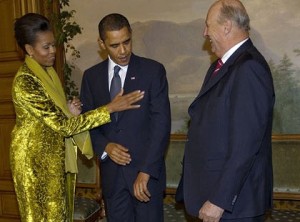
President Barack Obama spoke about the aspiration for peace and the necessity of war in his Nobel Peace Prize acceptance speech today.
In his Nobel Peace Prize acceptance speech today in Norway today, President Barack Obama spoke about the aspiration for peace and the necessity of war.
Obama opened his speech with the frank acknowledgment that his accomplishments are “slight” compared with others like Albert Schweitzer who have come before him before moving into a strong defense of the need, at times, for war.
Former warriors turned peacemakers like Nelson Mandela and Yitzhak Rabin have been awarded this honor before, but few so early in their tenure in public life and with so small a history of peacemaking behind.
In The Long Walk to Freedom, Mandela discusses the need for armed struggle in South Africa and the formation in the early 1960s of Umkhonto we Sizwe, or the Spear of the Nation, to carry out those actions.
For his part, Obama asserted the importance of a clear-eyed assessment of reality.
“I face the world as it is,” he said, perhaps unintentionally echoing the first and cardinal rule of community organizing articulated by Saul Alinsky in Rules for Radicals: Deal with the world as it is, not as it should be.
For Obama, that means confronting the reality both that non-violence, as valuable as it is, would neither have defeated Hitler’s armies nor defeated Al-Qaeda, and that violent conflict is not likely to end in our lifetime.
The president conceded that his recent decision to send additional troops to Afghanistan, and, more generally, that war in general means two inescapable outcomes: “Some will kill. Some will be killed.”
Later in the address, he added that, “no matter how justified, war promises human tragedy.
At the recommendation of Dart Fellow and Pulitzer Prize winner Amy Dockser Marcus, I just read David Finkel’s harrowing book, The Good Soldiers. A Washington Post editor, Finkel spent close to a year with a division of Rangers in Iraq during the period of the surge to combat the counterinsurgency there.
I will devote a whole post to this book later, and for now will say that it provides indelible confirmation of Obama’s assertions about Afghanistan and war in general. It makes for gripping reading.
Dr. King’s presence was significant through Obama’s address.
He mentioned King as a giant of history and as a proponent and practitioner of non-violent direct action. Obama also quoted directly from King’s 1964 Nobel Peace Prize address.
People who want to learn more about King and his speeches would be well advised to look at James Washington’s A Testament of Hope, a collection of many of King’s major addresses throughout the years.
Clayborne Carson, my undergraduate thesis advisor and director of the King Institute at Stanford University, has overseen the publication of a number of books of King speeches, too. Taylor Branch talks about what the global recognition of the prize meant to King in the second and third books in his outstanding trilogy about the civil rights leader that took 25 years to complete.
Obama closed his address by talking about alternatives to war, and about acknowledging the reality of war while striving peace. “We can do that — for that is the story of human progress; that is the hope of all the world; and at this moment of challenge, that must be our work here on Earth.”
The New York Times had a fascinating piece earlier this week about how Obama arrived at his decision to send 30,000 additional troops to Afghanistan. As with nearly all things, time will tell if that decision, and the doctrine he articulated today in Oslo, prove to be a wise one.
What we can say for sure is that his tendency to avoid conventional formulations and to accept dichotomies-he has often talked about individual and government responsibility, for example-were on full display for the world to see and her.
